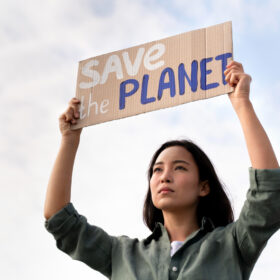What is climate change?
Earth’s climate has changed throughout history. Just in the last 650,000 years there have been seven cycles of large glaciations separated from each other by hundreds of years of hot weather, in which glaciers retreated. The sudden end of the last ice age dates back to around 7000 years ago.
Most of these climate changes are associated with small variations on our Earth.
The planet’s climate has constantly changed over geological eras.
The average global temperature today is around 15 ° C.
The current warming trend has a special meaning because most of it is the result of human activity in the mid-20th century and is proceeding at an unprecedented rate.
Greenhouse effect, what are the consequences?
The greenhouse effect refers to the way in which the earth’s atmosphere traps part of the energy from the sun.
The solar energy that radiates into space from the earth’s surface is absorbed by atmospheric greenhouse gases and re-emitted in all directions.
The energy radiating towards the planet warms both the lower atmosphere and the surface. Without this effect, the Earth would be colder than 30 ° C, making our planet hostile to life.
Scientists believe that the natural greenhouse effect is increasing with the gases released by industry and agriculture, the infamous “emissions”, trapping more energy and increasing the temperature.
This is commonly referred to as global warming or climate change.
Carbon dioxide (CO2), however, persists much longer (it would take hundreds of years to return to pre-industrial levels).
Most human-caused CO2 emissions are caused by the combustion of fossil fuels. When the forests that absorb the carbon are cut down and left to rot, or burned to leave space for pastures, the stored carbon is also released, contributing to global warming.
Other greenhouse gases such as methane and nitrous oxide are also released through human activities, but their overall abundance is nothing compared to carbon dioxide.
Since the beginning of the industrial revolution around 1750, CO2 levels have increased by over 30% and methane levels have increased by over 140%. The concentration of CO2 in the atmosphere is now higher than at any time in at least 800,000 years.
Scientists are uncertain about the extent of potential impacts. But all of this could lead to fresh water shortages, make radical changes to our ability to produce food and increase the number deaths caused by floods, storms, heat waves and droughts.
This is due to the fact that climate change should increase the frequency of extreme weather events, although we cannot be sure that a single disastrous event can be connected to global warming.
Scientists have predicted an increment of precipitations, but say the risk of drought in inland areas during hot summers will increase as well. Further floods are expected from storms and the rising of the level of the seas. However, there are likely to be very strong regional variations in these schemes.
The poorest countries, which are less equipped to cope with rapid change, could suffer more.
Plant and animal extinctions are expected, as habitats change faster than species can adapt and the World Health Organization (WHO) has warned that the health of millions of people could be threatened by the increase of malaria, diseases transmitted by water and malnutrition.
As more CO2 is released into the atmosphere, the absorption of CO2 by the oceans increases and this makes the water more acidic. This continuous process of acidification could pose serious problems to the coral reefs of the world, since changes in the ecosystem chemistry prevent corals from forming a calcified skeleton, which is essential for their survival.
Global warming will cause some changes that seem likely to create further warming, such as the release of large quantities of methane gas from the greenhouse effect as permafrost (permanently frozen ground found mainly in the Arctic) dissolves.
What proofs do we have?

The world is now warmer by almost one degree Celsius than before widespread industrialization, according to the World Meteorological Organization (WMO).
The last 22 years have been recorded as the hottest years, with the last five from 2015 to 2019 hitting an unprecedented record.
Worldwide, the average sea level has increased by 3.6 mm per year over the period 2005-2015. Most of the change in sea level was once due to the thermal expansion of sea water. As the sea water warms up, it causes an increase in ocean volume.
But the ice losses at the poles are now considered the main driving factor of this trend. Most glaciers in the regions of the world with mild climates and along the Antarctic peninsula are in retreat. Since 1979, satellite records show a dramatic decline in Arctic sea ice extension, at an annual rate of 4% per decade. In 2012, the extension of the ice reached a new negative record: it was 50% lower than the period from 1979 to 2000.
How much will the temperatures increase in the future?
Most simulations indicate that the global change in surface temperature by the end of the 21st century will probably exceed by 1.5 ° C, compared to 1850.
The World Meteorological Organization (WMO) says that if the current trend towards warming continues, temperatures could rise by 3-5 ° C by the end of this century.
A threshold of 2 ° C had long been considered the gateway to dangerous heating. More recently, scientists and politicians have argued that keeping the temperature within 1.5 ° C is a safer limit for the world.
Compliance with the 1.5 C objective would require rapid, far-reaching and unprecedented changes in all aspects of society.
Although we are now drastically reducing greenhouse gas emissions, scientists say the effects will continue because parts of the climate system, particularly large bodies of water and ice, can take hundreds of years to respond to temperature changes. It also takes decades to remove greenhouse gases from the atmosphere.






